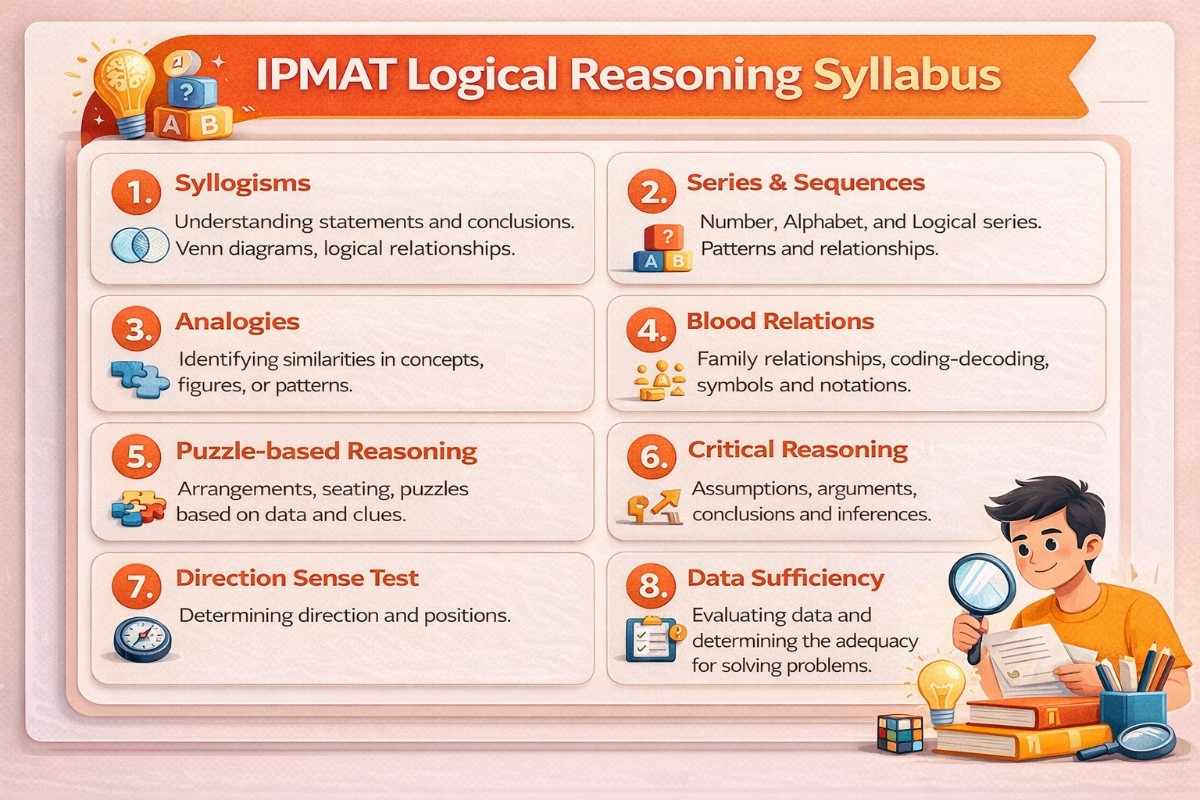IPMAT Logical Reasoning Syllabus 2026 for IIM Indore & IIM Rohtak
January 27, 2026
Overview: Unlike IPMAT Indore, which integrates logical reasoning within its Quantitative Aptitude section, IPMAT Rohtak features a dedicated Logical Reasoning section with 40 questions. Explore the comprehensive IPMAT Logical Reasoning syllabus to enhance your preparation for the 2026 exam.
The Integrated Programme in Management Aptitude Test (IPMAT) is an entrance exam conducted by the Indian Institutes of Management (IIMs) at Indore and Rohtak for admissions into their five-year Integrated Programme in Management.
While IIM Indore is renowned for blending higher mathematics in its syllabus, IIM Rohtak emphasizes a distinct section on the IPMAT Logical Reasoning syllabus.
This article delves into the specifics of the logical reasoning syllabus for IPMAT 2026, particularly for IIM Rohtak, contrasting it with the exam structure of IIM Indore.
Table of Contents
IPMAT Logical Reasoning Syllabus 2026 IIM Indore vs. IIM Rohtak
IIM Indore
Contrary to a standalone Logical Reasoning section, the IPMAT Indore incorporates logical reasoning questions within the Quantitative Aptitude (QA) section.
This includes sets of Data Interpretation or logical puzzles, with topics such as Linear arrangements and Games & tournaments.
It's crucial to analyze IPMAT's papers from the previous year to understand the nature of these questions. Notably, this version includes advanced mathematics (Classes 11 & 12), a unique aspect among management entrance exams.
IIM Rohtak
In contrast, IIM Rohtak's IPMAT syllabus maintains a dedicated Logical Reasoning section.
This distinct approach not only separates the types of reasoning questions but also allows for a broader range of topics, enhancing the section's complexity and focus.
IPMAT Logical Reasoning Syllabus 2026
The Logical reasoning section of the IIM Rohtak IPMAT exam examines your ability to analyze and solve problems using various reasoning techniques.
To excel in this section, focus on practising a range of topics that are typically covered, such as:
Check out the table below to know important topics under the logical reasoning section of the IIM IPM exam syllabus.
| Coding | Arrangements | Cubes & Dices | Blood Relations |
| Venn Diagrams | Input & Output | Binary Logic | Syllogism |
| Statements & Conclusions | Statements & Assumptions | Critical Reasoning | Strong & Weak Arguments |
| Assertions & Reasonings | Logical Sequence Series | Inference & Judgements | Clocks |
| Calendars | |||
Read: Why is Logical Reasoning Important in IPMAT?
The Quantitative Aptitude section often includes but is not limited to:
- Data Interpretation (DI): Involving charts, graphs, and tables to interpret and analyze data.
- Logical Puzzles: Covering sequences, arrangements, or problem sets that require logical deduction.
- Higher Mathematics: Questions from Class 11 and 12 mathematics that require logical thinking to solve complex problems.
Read: How to Solve IPMAT Maths Questions?
No. Of Question from IPMAT Logical Reasoning Syllabus 2026
Last year, the Logical Reasoning section included questions in IPMAT Rohak on the following topics from the IPMAT logical reasoning syllabus:
| Topic | Number of Questions |
| Direction Test | 3 |
| Coding Decoding | 3 |
| Circular Sitting Arrangement | 5 |
| Linear Arrangement | 2 |
| Number Series | 1 |
| Blood Relation | 1 |
| Cube | 1 |
| Dice | 1 |
| CR-Critical Reasoning | 2 |
| Data Sufficiency | 2 |
| Comparison Data Arrangement | 2 |
Preparation Strategy for IPMAT Logical Reasoning Syllabus 2026
Understanding the nuances of the logical reasoning syllabus and the distinctive approach of IIM Rohtak and IIM Indore is important for effective preparation.
Here's a month-wise study plan for IPMAT Logical Reasoning syllabus preparation:
Month 1: Foundation Building & Introduction
Focus: Understanding basics and starting with easier LR topics
Week 1:
- Introduction to Logical Reasoning (LR) and exam expectations
- Learn concepts of linear arrangements (single/double row)
- Daily: Solve 5–6 linear arrangement problems
- Practice: 30 mins daily with basic puzzles
Week 2:
- Coding-Decoding (letter shifting, number coding, pattern rules)
- Begin easy family-based blood relation questions
- Daily: 3–4 coding questions + 3–4 blood relation questions
- Practice: Create family trees from statements
Week 3:
- Continue with blood relations (puzzle-based)
- Revise linear arrangements
- Daily: 2 practice sets each of blood relations & arrangements
- Saturday: Weekly quiz or mini-mock (20–25 min)
Week 4:
- Practice mix of all 3 topics (arrangements, coding, blood relations)
- Introduce basic analytical puzzles
- Daily: 4–5 mixed questions + 1 timed puzzle
- Sunday: 30-min mock + review
Month 2: Development of Basic Skills
Focus: Venn Diagrams, Sequences, and Circular Arrangements
Week 5:
- Circular arrangements (single/double circle)
- Practice direction-based logic questions
- Daily: 3–4 circular arrangement + 2 direction sense sets
Week 6:
- Matrix arrangements (3 variables)
- Practice grid-based puzzles
- Work on visualizing tabular data
- End week with 30-minute timed test
Week 7:
- Sequences and Series (alphabet and number-based)
- Begin simple pattern recognition
- Daily: 10 sequence/series questions
- Solve 1 LR puzzle from previous topics daily
Week 8:
- Venn diagrams (2-set, 3-set logic problems)
- Combine sets with real-life data (students, languages etc.)
- Weekend: Mixed-topic quiz (25 questions)
Month 3: Reasoning Techniques & Complex Logic
Focus: Input-Output, Syllogisms, Clocks & Calendars
Week 9:
- Introduction to Input-Output (machine logic, shifting patterns)
- Practice step-based rules
- Daily: 2 sets (each with 5 steps)
Week 10:
- Learn Venn diagram approach to Syllogisms
- Practice with both affirmative and negative conclusions
- Daily: 8–10 syllogism questions
Week 11:
- Clocks: Angle-based, mirror images, correct time
- Calendars: Odd days, leap years, day-date logic
- Daily: 3–4 clock + 3–4 calendar questions
Week 12:
- Mixed practice from Month 3 topics
- Take 2 mini-mocks (30–40 minutes)
- Identify speed vs. accuracy gaps
Month 4: Advanced Problem Solving & Mock Tests
Focus: Complex puzzles, Critical Thinking, Assertion-Reasoning
Week 13:
- Complex Puzzles (multi-variable seating + conditional statements)
- Solve 1 long puzzle per day
- Review arrangement mistakes
Week 14:
- Binary Logic (truth-teller/liar problems)
- Practice 5–6 short sets daily
- Daily reasoning diary: Note traps and smart elimination
Week 15:
- Critical Reasoning (arguments, assumptions, inferences)
- Assertion/Reason statements
- Practice short RC-like logic passages
- Midweek: Full-length LR section test
Week 16:
- 2 Full-length LR mocks (Mon & Fri)
- Analyze: Question-wise time, accuracy
- Focus on high-weightage areas
Read: How to Solve IPMAT Logical Reasoning Questions Quickly
Month 5: Integrated Practice & Mastery
Focus: Visual Reasoning, Cubes/Dice, Mixed Sets, Strengthening Accuracy
Week 17:
- Dice and cube-based reasoning
- Practice unfolding cubes, hidden faces, dice coding
- Visual puzzles (counting figures, mirror images)
Week 18:
- Advanced sequences (odd-one out, dual-patterns)
- Multi-step deductions
- Time-boxed practice sets (30 mins)
Week 19:
- Mixed topic tests (15–20 questions per set)
- Revise notes and strategy for weak areas
Week 20:
- Full-length mock test (2 this week)
- Analyze: Focus on time-consuming vs easy pick questions
- Practice 20 mins of speed drills (topic-wise)
Month 6: Final Review, Speed Enhancement & Exam Readiness
Focus: Timed practice, Mock series, Mental Preparation
Week 21:
- Topic-wise speed drills (e.g., 20 blood relation Qs in 20 mins)
- Flash review of notes and key concepts
Week 22:
- Full-length mock tests (2–3)
- Track accuracy + error patterns
- Revise Binary logic, Complex Puzzles
Week 23:
- Light practice, avoid overburdening
- 1–2 mock tests, only error-based revision
Week 24:
- Mental prep week: stay confident
- Revise tricks, shortcuts
- Do 2 very light mocks for stamina
- Prioritize rest and revision over new learning

For candidates aiming to excel in the IPMAT and secure admission into the prestigious IIMs at Indore and Rohtak, understanding the nuanced differences in the logical reasoning components of the entrance tests is critical.
Students can significantly enhance their chances of success by focusing on the detailed IPMAT logical reasoning syllabus and structuring their preparation accordingly.
This comprehensive guide serves as a roadmap to navigate through the complexities of the exam and emerge successfully.
Key Takeaways:
- Exam Structure Differences: IIM Indore integrates logical reasoning questions within the Quantitative Aptitude section, whereas IIM Rohtak offers a separate, dedicated Logical Reasoning section.
- Key Topics: IIM Rohtak's IPMAT Logical Reasoning syllabus 2026 covers various topics, including coding, arrangements, critical reasoning, and more.
- Scoring and Format: The Logical Reasoning section for IPMAT Rohtak consists of 40 questions, each carrying four marks, with a penalty of 1 mark for incorrect answers.
- Preparation Strategy: Effective preparation tips involve mastering essential topics before advancing to more complex ones and regularly practicing with mock tests.
- Mock Tests: Regularly engaging in mock tests is essential for familiarizing oneself with the exam format and improving time management skills.
Frequently Asked Questions
What topics are covered in the IPMAT Logical Reasoning syllabus for IPMAT Rohtak?

How is the Logical Reasoning section structured in IPMAT Indore compared to IPMAT Rohtak?

What is the format of the Logical Reasoning section in IIM Rohtak's IPMAT 2026?

What is the best way to practice for the Logical Reasoning section?

Is there a difference in difficulty level between the Logical Reasoning sections of IPMAT Indore 2026 and IPMAT Rohtak 2026?









SHARE